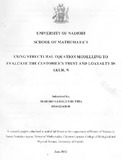| dc.description.abstract | Measurement of customer satisfaction In behavioural health services has received increasing
emphasis due to clinicians' and researchers' desire to measure outcomes that reflect the patient's
unique perspective. The healthcare service is a high credence service. Not only patient
satisfaction but also patient (emotional) trust with health care service providers is regarded as
important to the patients. Moreover, the ultimate aim of every patient is to have his/her disease
cured or have their health improved or feel more comfortable after treatment. Any satisfying
strategy from healthcare service providers without achieving these purposes is meaningless.
These parameters differentiate the model in healthcare service from other services in general.
This research studied the role of patient loyalty in the relationship between patient satisfaction
and trust. It also examined the factors affecting patient loyalty and patient trust.
The researcher used a descriptive research design since this type of research attempts to describe
such things as possible behaviour, attitudes, values and characteristics (Mugenda et aI, 2003). In
this design, data is collected in order to test hypothesis or answer questions concerning the
current status of the subject in study. Cluster sampling was used to obtain the respondents in
which a sample size of 251 representing 89% response rate was achieved. Confirmatory Factor
Analysis and the Structural Equation Model were used to analyse the casual relationships
between service quality, customer trust, customer satisfaction, and customer loyalty. Based on
the theoretical model, a comprehensive set of hypotheses were formulated and a methodology for
testing them outlined. These hypotheses were tested empirically to demonstrate the applicability
of the theoretical model. The endogenous variables formed by the exogenous variables have
shown strong direct and indirect relationship to the response variable. Amongst all, customer
satisfaction has shown considerable impact on loyalty directly and indirectly as an intervening
variable. The perception of quality of service garnered 96.3%, customer satisfaction was 90.8%,
and trust was ranked 92.7% while loyalty was ranked as 88.7%. The study shows that Customer
satisfaction explains so much variation on customer loyalty unlike quality of service to loyalty.
The entire posited hypotheses have been supported within the stated criterion.
v | en |

